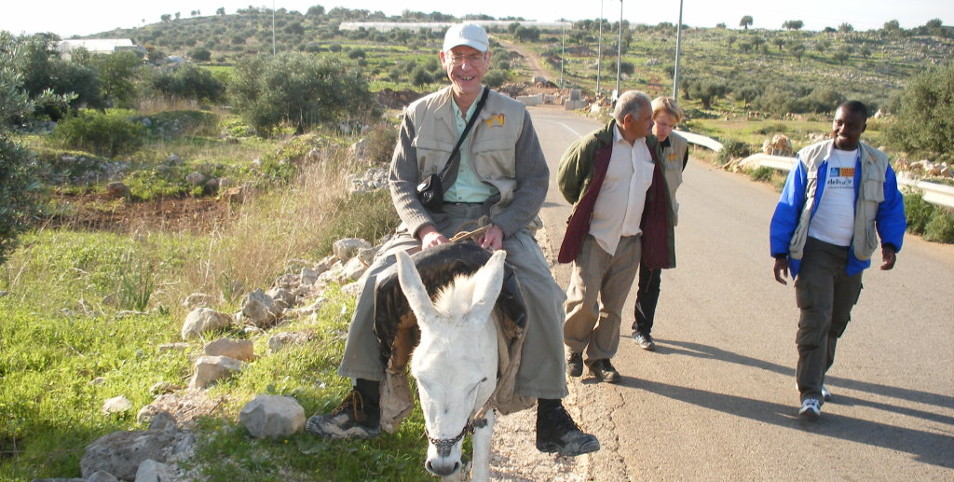Beauty and the Beast
I have just returned from a wonderful walk in the hills around the tiny village of Yanoun where I am on a three day visit with the EAPPI team here. The scenery is spectacular, very reminiscent of the Yorkshire Dales. Rolling hills, limestone pavements, clints, scars, ancient dry-stone walls and a herd of deer. Plus the added bonus of a view of the Jordan valley and even the Jordan river itself. On good days, one can see the Dead Sea. Closer to hand there are gorgeous wild flowers, including bright red anemones and delicate pink orchids. With Joiakim, my Norwegian colleague, I visited the (supposed) grave of Nun, the father of Joshua. We visited a local farmer who was milking his sheep. His wife was baking and she gave us some utterly delicious bread, straight out of the oven. We sat on the floor and drank a glass of Palestinian tea, (fairly weak with plenty of sugar but no milk and flavoured with a mint leaf). Their son offered us some hashish to smoke(!) Regretfully, we refused. Soon we made our leisurely way back through the olive groves and up the hill to the simple, cosy team house where our colleagues welcomed us with a tasty supper.
An idyllic day. But . . .
On the surrounding hilltops various constructions mar the landscape. Watchtowers, animal sheds, gas containers, floodlights, caravans. These are “outposts” of the Israeli settlement, Itamar, about seven miles away. They are home to a number of Israeli settlers who, since 1996, have made life extremely difficult for the villagers of Yanoun. They even drove the villagers out completely in 2002 until Israeli peace activists, followed by the EAPPI presence, enabled them to return. They have appropriated many of the villagers’ fields and they have established “no-go areas”. Rashid, the village mayor, told me how a man from Yanoun wandered into one of these areas only three weeks ago. That night, at 3 o’clock in the morning, Israeli soldiers arrived in the village, with one of the settlers, and dragged all the men of the village out of their homes. They said that the settler had seen a man on his land who “had the intention of stealing his sheep” and they threatened them with dire consequences if this happened again.
For years, the settlers have gradually encroached on Yanouni fields, taking one field after another. The Yanounis are powerless to stop this process because the Israeli soldiers see their main duty as supporting the settlers, in spite of the Geneva Convention which states that the job of an occupying army is to protect civilians in the occupied territory. The Yanounis dare not venture near the settlers’ areas, but the settlers feel free to walk through Yanoun whenever they please, armed with machine guns. Sometimes they stop to climb down a 20 metre ladder in order to bathe in the village well. There is a long history of settler violence, and even murder, against the villagers. The full story can be read in “Living With Settlers” by Thomas Mandal .
These settlers are people who believe passionately that God has given them the whole of the land of Palestine. It is the “Promised Land” first won by Ancient Israel under Joshua’s leadership, but lost for 2000 years. Now, with a supposed mandate from God, it is gradually being regained by violence and intimidation against the Palestinian people who have lived there for hundreds of years.
Settlements and outposts are both both illegal under international law because they are not in Israel, but are in occupied Palestinian territory. Under Israeli law, settlements are legal, but outposts are not. Nevertheless, in disputes with local Palestinian people, the Israeli army always sides with the settlers from the outposts. The Israeli government appears to be fully behind this process of “land-grab” although its rhetoric is frequently about “curbing settlement expansion”.
So my idyllic stay in the limestone hills was strangely unreal. Surrounded by beauty, yet always conscious of the menacing presence around me. Ironically, the unchanging, rugged, biblical landscape is the context for acute insecurity. When will they come into our village again? Will they attack us? Which field will they take from us next?
I am able to walk away and return to my comfortable home. But the villagers of Yanoun live every day with uncertainty and fear. Most of us in the West are generally oblivious to the fact that one nation is insidiously and inexorably stealing the land of a neighbouring people. Who will stand up for these people?
